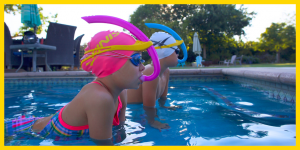February 14, 2019
At RITTER Sports Performance, we have been able to talk with hundreds of swim coaches. Most of them on the podcast, at swim meets, clinics and through our Facebook and Instagram accounts. After talking with that many coaches, you start to see patterns. One that’s very relevant to this time of year is:
Tapering and championship meet season is just as stressful for coaches as it is for swimmers!
But if coaches aren’t aware of their own emotional state they can quickly become a very negative variable in a swimmer’s quest for their best performance at the championship meet.
Here are the top ways that coaches can ruin a taper for swimmers:
1) Confusing workout variables
Coaches inevitably start to second guess themselves during the taper time.
“Did we work hard enough?”
“Did I miss teaching a certain technique during the season?”
“How much should we rest?”
“Will they really swim as fast as I know they can?”
Every swim coach has had some of these thoughts run through their head this time of year. But the most important thing is to not listen to these voices!
At this point of the season, making big and drastic changes is the worst thing that you can do to your program.
Keep on the track that got you to this point in the season. But drop the volume a little bit and the intensity too.
But even this simple advice can get tricky. Every swimmer is different and during taper, the coach needs to be able to adapt to best serve their athletes and give them what they need.
Swimmers often fall into a few buckets when it comes to how to successfully taper:
- Drop both volume and intensity
- Keep the volume around the same but drop the intensity
- Drop the volume but keep the percent of intensity the same
There’s no “one size fits all” when it comes to taper but knowing as a coach that your swimmers will usually be in one of these scenarios can be helpful.
Then there are even some swimmers that don’t need that much of a change in their training at all come taper time.
Remember though as a coach you shouldn’t change too much. Steady and smooth changes are what’s needed this time of year.
Another variable when it comes to how well swimmers are “resting” is what type of fatigue are they actually dealing with?
Coaches usually focus in on the physical fatigue. But mental and emotional fatigue can be just as draining and sometimes taper type workouts can actually increase a swimmer’s anxiety about their future performance and getting their goal times.
As a coach, you need to be aware of the different types of fatigue that you’ll have to take into account this time of year.
2) Having a bad relationship or poor communication with their swimmers
Most of the “issues” that arise during taper time were usually there throughout the season. But it’s now that they become magnified.
The swimmer/coach relationship is maybe the biggest example of this.
As a coach if you’re not cultivating a good relationship, one in which you and your swimmer can have good communication, then taper time can become incredibly negative.
During the last few weeks before a championship meet it’s important for the coach to be able to have discussions with the swimmer about their training and how they’re feeling. And of course, these would-be age and ability-level specific.
So, if you don’t have an open line of communication, this time of year can quickly get off track.
You need to remember the taper isn’t about you as the coach, it’s about what the swimmers need to be at their best when it matters the most.
Sometimes this means the coach has to write more “boring” workouts because the swimmer needs much less intensity.
Not many coaches enjoy writing easy workouts!
But if this is what the swimmer needs then that’s what the coach should give them. However, this can’t be understood if there’s little or poor communication.
3) Neglecting their own self-care
This is probably the least discussed topic when it comes to taper, especially from the coaches’ perspective.
Of course, during taper coaches will encourage their swimmers to get more rest, eat better and drink more water.
But if this time of year is the most stressful for coaches, then they should be redoubling their own efforts to care for themselves!
A coach that is stressed out about how their swimmers will perform will not be the best coach they can be.
As a coach, you need to think how you can protect your athletes from unnecessary stress during taper. That includes the stress that you put off as a coach that isn’t needed!
Enjoy a nap with a shorter practice schedule. Get out and do something you enjoy during the week so you can prepare for the stressful weekends ahead.
If you don’t take care of yourself as a coach you can’t take care of your athletes!
Recent Articles
Dylan Carter
Chelsea Hodges
Lorenzo Zazzeri

Introducing the Stability Snorkel Jr
Share on Social Media


